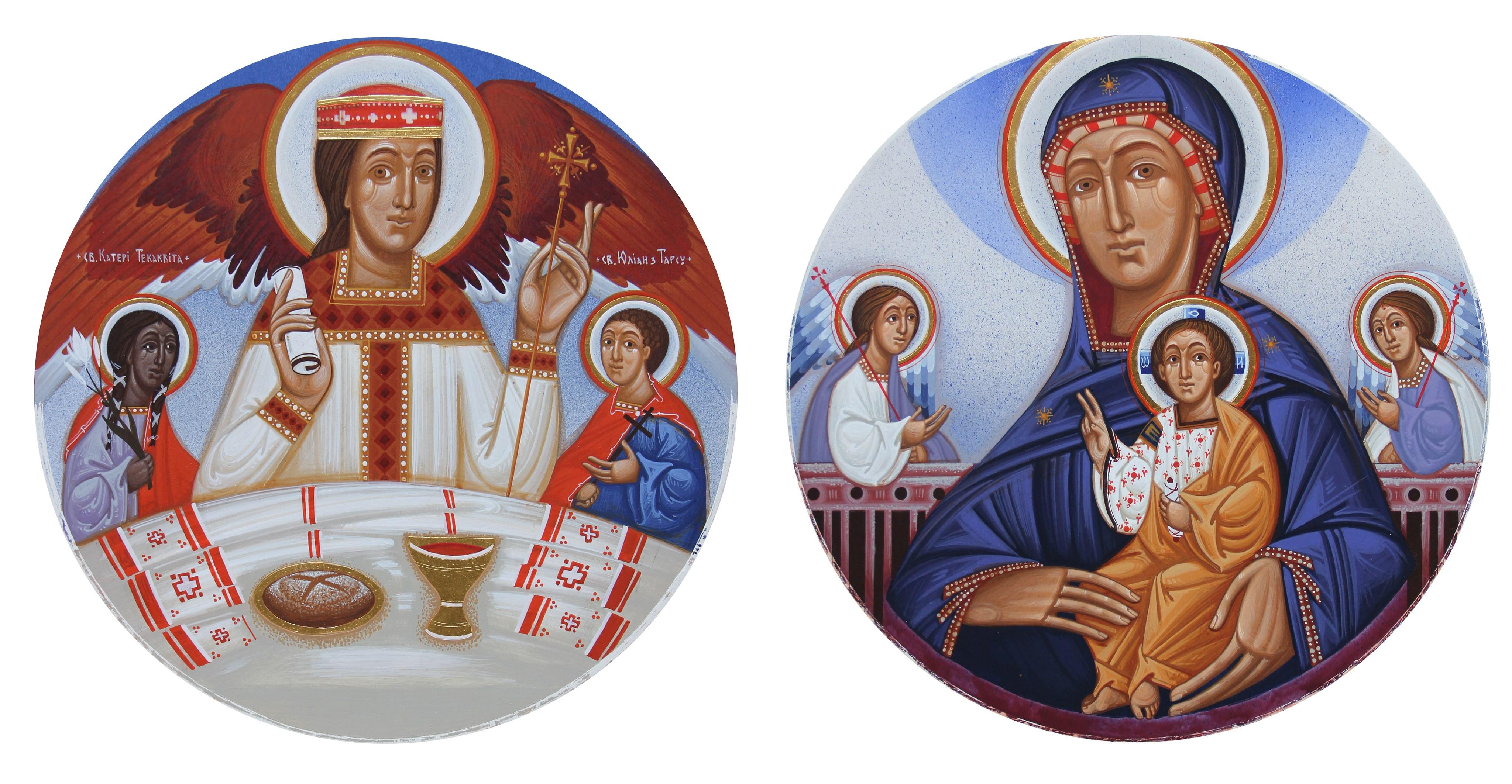Summer + Julian
Traditions

Question
What's the deal with those icons?
Answer
We commissioned our wedding icons from Ivan Dashko, a talented young man from Lviv, Ukraine. The icons are held by our starosti (elders) throughout the wedding day, and are essential to the morning family blessing and the church blessing. Usually, the two icons depict Jesus Christ and the Mother of God. But following the custom established by Julian's parents, the second icon in our case depicts Sophia, a personification of God's Holy Wisdom, breaking bread with St. Kateri Tekakwitha and St. Julian of Tarsus, Summer and Julian's patron saints, respectively. The patron saint of environmentalists, Kateri was the first indigenous American to be canonized and St. Julian was a 4th century Greek soldier who was martyred for being "a Christian of senatorial rank." Devotions to Sophia run deep in the Ukrainian Christian Tradition, going back more than a thousand years. During WWII, the head of the Ukrainian Church, Andrey Sheptytsky, invoked the Sophia to bring an end to Nazism.
Question
Why is your ceremony called a "crowning"?
Answer
The Church didn't conduct marriage ceremonies until the 9th century. Until then, if you wanted to get married, you needed a civil ceremony (which the Church would endorse). In the Byzantine Empire, where our rituals come from, important civil ceremonies were marked with coronations. The ceremony for a new emperor, who ruled over a realm, and a married couple, rulers over their domestic affairs, was the same. Unlike an oath or a signature on a document as in the West, crowns were a legally binding expression of changed status in Byzantine society. That's why Summer and Julian won't be exchanging vows—the moment of their marriage is when the priest places the crown on their heads. Historically, crowns in the Mediterranean region were made from olive branches, but wealthier people came to use metal crowns later. Neither were accessible to our people, so we're going the traditional route with periwinkle flower crowns, which Summer and her sisters will weave the night before our wedding.
Question
Why isn't anybody "giving away" Summer?
Answer
Remember how we said we don't do vows in our Tradition? Part of that has to do with the fact that Summer and Julian both consented to marry one another, as equal partners, long before they ever set foot in the church. The custom of the bride's father "giving away" his daughter goes back to arranged marriages in 16th century Britain, when women were treated as property, and it was often the first time the bride and groom even met. In this context, the wedding was little more than a business contract between families, with consent being very far down the list of priorities. Marriage never served quite the same purpose in the Christian East, and Ukraine especially has a robust tradition of co-equal courtship between genders. Parents may be protective of their children, sure, but it's not about property. That's why Summer and Julian will come together at Summer's home (or hotel room, as the case may be) and parade to the church together, in the presence of their joyful families.
Question
Why is there a broom on the floor of the church?
Answer
Black Slaves in the United States weren't often permitted to marry one another. They also didn't own property to be able to signify marriage, such as a ring. They often created and adapted rituals to signify lifelong commitment with a spouse, as unrecognized as it may be. We recognize that the marriage between Summer and Julian would have been illegal in most states if they been married even during their parent's lifetimes. In the early 19th century, a Romani custom from the British Isles took off among slaves in the American South. In order to symbolize passing from one stage in life to another—from being single to being married—the couple would hold hands and jump over a broom. The broom sweeps away evil, and brings in the new. This ritual is also analogous to a traditional Ukrainian wedding ceremony, where the couple steps onto an embroidered cloth, a Rushnyk, at the same time. Hence both "Stepping on the Rushnyk" and "Jumping the Broom" are euphemisms for marriage.
Question
What's this wedding reception music?
Answer
Our music will be a mix of genres that are important to Summer and Julian. It's music they enjoy, but also a nod to their heritage. Summer's father is a world-renowned House music producer and DJ. In fact, her parents met during House parties in the 1980s. House is a music genre that was invented by Black folks in Chicago, and combines the beats of Disco with the attitudes of Funk. House has been exported around the world, especially Eastern Europe, forming the basis of Euro Techno which was very formative for Julian. The wedding reception music will be provided by DJ Lil John, a friend of Summer's parents, who has been well-known on the House scene since the '90s, and spins often on 106.3 FM Late in the evening, there will also be a few ritual Ukrainian dances, such as the Kolomyjka (all are invited to show off their moves in the circle), and the bride's dance, which is our version of the bouquet toss: Summer will give a headscarf all of the single ladies while dancing in a circle.